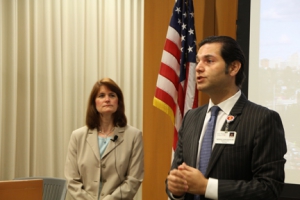The second annual Roxanna Todd Hodges Visiting Lectureship in Stroke Prevention and Education was awarded to Cheryl Bushnell, MD, MHS, associate professor of neurology at Wake Forest School of Medicine. Bushnell is director of the Wake Forest Baptist Stroke Center and a thought leader in issues regarding women’s health and stroke, and performing community interventions for reducing stroke risk.
Bushnell’s lecture, “21st Century Stroke Prevention: What will it look like?” was presented at Neurology Grand Rounds held the morning of Aug. 6 at the Zilkha Neurogenetic Institute, part of the Keck School of Medicine of USC.
During the lecture, Bushnell focused on how stroke prevention might be accomplished in the near future if physicians focus on changing the way people behave to lower known risk factors, including hypertension, smoking, obesity, diabetes, alcohol and cardiac causes.

Nerses Sanossian, MD, assistant professor of neurology and co-director of the Roxanna Todd Hodges Comprehensive Stroke Clinic and TIA program, introduces 2013 Roxanna Todd Hodges lecturer Cheryl Bushnell, MD, MHS, associate professor of neurology at Wake Forest School of Medicine.
(Photo/Amy E. Hamaker)
“We know from large studies that these are the main risk factors in population-attributable risk,” said Bushnell, “and that they can explain about 82 percent of stroke risk.
“We pretty much know what to do to lower the risk,” she continued. “If we could appropriately treat hypertension, for example, we could effectively reduce the risk of stroke in 360,000 people.”
Bushnell’s focus for stroke prevention was on adherence to prescribed medication and treatment routines, and how simply continuing to take their medicine can improve the risk for many patients. Factors that affect adherence can range from negative side effects to medication to the instructions given by and the accessibility of medical personnel.
Twenty-six guests attended a dinner in Bushnell’s honor the previous night at the Los Angeles Athletic Club. The lectureship is part of an integrated vision to provide exceptional education in stroke prevention.
Nerses Sanossian, MD, assistant professor of neurology and co-director of the Roxanna Todd Hodges Comprehensive Stroke Clinic and TIA Program, introduced Bushnell before she began, and presented her with a plaque and a token of appreciation. “We are honored to have such a distinguished lecturer receive this award that supports the mission of the Roxanna Todd Hodges Foundation, to reduce the burden of stroke in Southern California through prevention and education,” he said.

